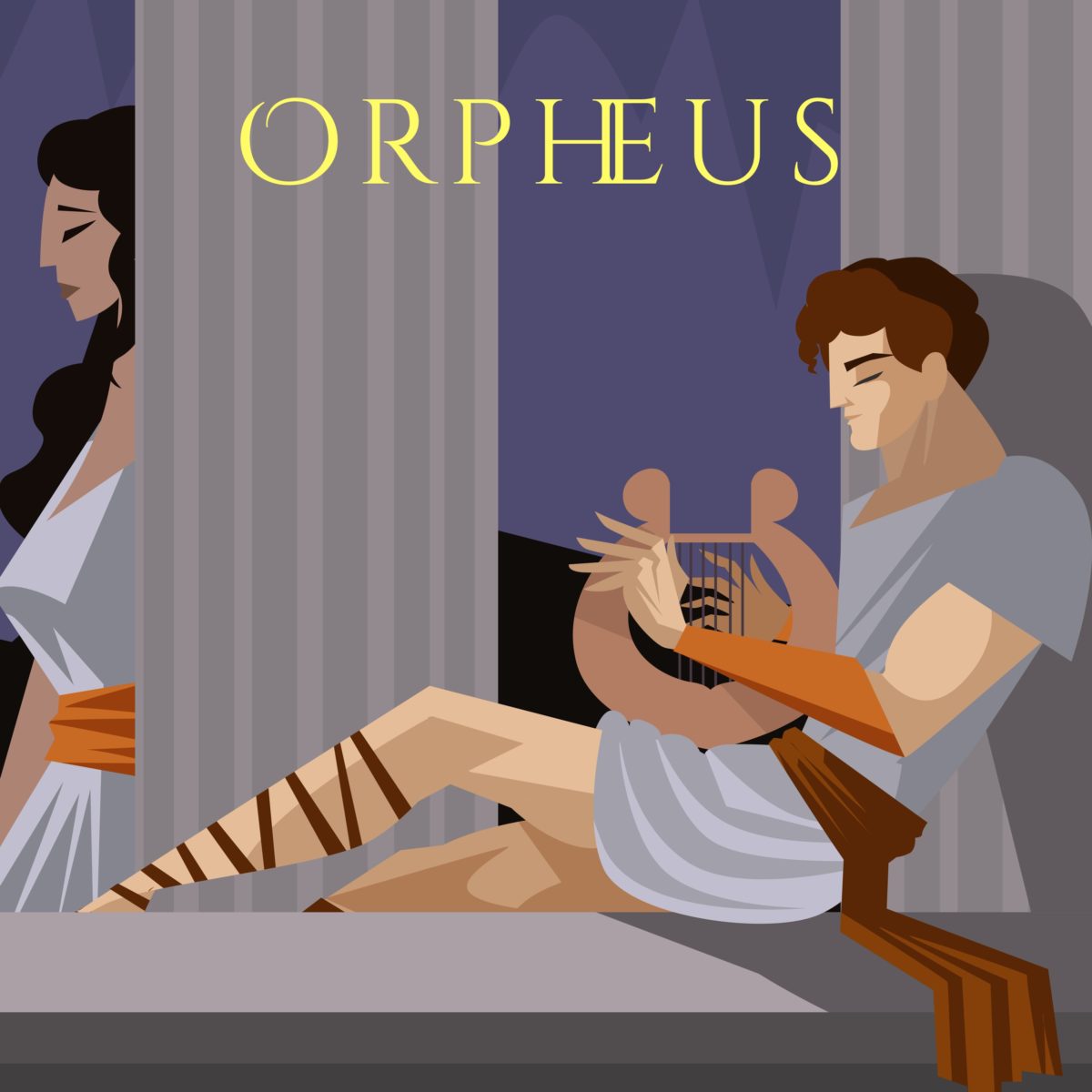Orpheus - Greek Myths

We bring you this sad but, we hope, beautiful story in verse. Orpheus the musician married Eurydice the shepherdess. When she was killed by a snake, he traveled down to the underworld and was granted one chance to fetch her back to life. Bertie has freely adapted this ancient tale into his own poem. Yes, we did warn you, it is sad.
Adaptation by Bertie.
Read by Richard. Duration 12 minutes.
Proofread by Jana Elizabeth.
I speak of a man of sweet honeyed melody,
Whose love sick heart had no remedy
But to travel to where none before,
Save sad souls who live no more,
Have been and seen and ne’r come back:
The land of death where all is black.
But where we start is under the sun,
Of ancient Greece, where legends begun.
Orpheus his name, and music he made,
Like no other who sang or played.
His notes unfold upon the breeze
He woos the birds, he charms the trees,
No living thing is quite immune
When Orpheus plays his tender tune.
His skill commands the strings of the lyre
Under his orders, it sings like a choir
Of love for a woman: Eurydice.
Though his tongue was tied in speech, he,
As a man who hardly knew her,
Walked by her side and tried to woo her.
Without reply. Her pretty head -
She turned away, and no word said.
She, sixteen, a sweet shepherdess,
Her heart, not hard, but I tell you, no less
Than twenty suitors she had turned away,
For she thought it too soon to see her wedding day.
But then he sang, and his sweet voice carried
Straight to her heart, and soon they were married.
Oh what a wedding! I wish you were there,
To join the feast in open air,
A thousand guests, a handful human,
The piper God Pan and his crewmen,
Nymphs and Dryads, Satyrs and Fauns,
Demi-Gods dancing all over the lawns
Horns and hairs sprout from their faces
For ancient Greece was one of those places
Perilously populated by peculiar creatures
Who in modern times don’t often reach us,
Gods mingled with mankind
And often offspring, they left behind,
Back then, no one thought it queer,
To see a girl, with a head like a deer,
Or when out wondering some woodland track
To find a boy with a goaty back.
Eurydice smiled and danced and charmed
All who saw her were quite disarmed,
Is she mortal, or a goddess divine?
Oh too mortal, Eurydice mine!
The sweet Cicadas in the grass
Sang their legs off, but none could surpass
The melodic magic of the man
Who outdid all nature as he sang.
Orpheus played upon his lyre.
Love out-glowing the sunset’s fire.
Darkness fell, the dryads danced on
And Eurydice sang and tripped along.
The flock of girls ran down to the stream
And splashed along the waters clean.
The bride lifted up her white wedding hem
And hurried along, ahead of them,
But alas alas she did not see
The snake that struck beneath her knee.
Venom flowed deep from deadly fang
And over the hills the mourning bell rang.
When Orpheus kissed the lifeless hand
Her soul had gone to another land,
His lungs gulped air as if to cry,
But he could not cry. His eyes were dry.
The hills were silent as if for a year,
And then he sang, a song so sincere,
So sad, so simple, so straight from the gut,
That all who heard it, felt nothing but
The sweet sadness of this turning world,
Where beauty must wrinkle, and grow old,
That, or in the warmth of youth, turn cold.
Men heard it, Nymphs heard it. Fawns heard it. Gods heard it.
Down in the depths of Hades, the word it,
Reached the royal ear of the Lord of the Dead.
Pale-faced Pluto, whom all men dread.
He spoke to Persephone, the Queen of the hosts,
Who inhabits the depths where all are ghosts.
“Dearest, deathly, Queen have you heard,
The ringing music, the lovely sound,
The lament which echoes all around,
The land of the sun, and the world of the gloom,
For the girl Eurydice, who has met her doom?”
"Yes, my dear, I have heard the cry,
"Why," he sings, "must sweet she die,"
"My young simple shepherdess,
Who is yet to feel, her husband’s caress?"
"We doomed death so soon, for it must be so,
That the mortals feel, their share of woe,
But now I regret it. I feel it’s not fair,
That a voice of such beauty, be filled with care."
And so it was, Orpheus sang by the river,
The Styx, it is called, it causes a shiver,
For it flows over ground, then down beneath,
To the land that’s guarded by the teeth,
Of Cerberus, the three headed dog of death.
When you breathe no more, you smell his breath.
While Orpheus sang a boat came by
Propelled by a wind that sounded like a sigh.
The ferryman offered to carry him along,
To where none who lives can linger long.
So down to Hades, Orpheus went,
The first living man, who there was sent.
And when the dog who guards the gate,
Growled to him that he must wait,
Till death deals its dreadful blow,
He sang back, No no no!
Only he sang it so sweetly, so piteously, so sadly,
That the dog rolled the rock back, only too gladly,
And the music man entered the gates of Hell,
The place where we all must one day dwell.
And there Orpheus met, the ghost of his mother,
He tried to hug her, but could only recover,
A fleeting, empty, insubstantial thought,
Of she who had loved him, since he was naught.
And then he was granted, an audience before,
The Queen of Death, whom all hold in awe.
She whose heart does not beat,
Save once, when she heard a musician entreat,
A sentimental lament to reverse the law,
That has held enthrall, all before,
No ordinary musician, but Orpheus he,
Who moved to pity, Queen Persephone.
"I grant your wish, for your wedded wife,
That she should return back to life,
You may lead her up the trail to light,
But not once, must you take in the sight
Of she who follows faithfully your way.
Do not look back, or she shall stay!"
So spoke Persephone, and Orpheus heard,
And he agreed, to her every word.
He set off to the world of life,
Playing a love song for his longed-for wife,
She followed happily, twenty paces behind,
But Orpheus fell victim to his artistic mind
To be ruled by reason he was never meant,
Impulse and passion made up his temperament.
The journey was long and the way was steep,
Far too far, for Orpheus to keep
His promise to she who is queen of Always,
Who when she speaks, means what she says.
He wavered you see, he suspected a trick,
He worried himself, until he was sick.
Perhaps the Queen had given her word,
Only to make him look absurd.
What if his wife had lost the track?
He could not help it. He looked back.
"Goodbye my sweet, adieu, adieu,
I only gave my love to you,"
So sang his wife, Eurydice,
A simple, sad, sweet melody.
And Orpheus took his beloved lyre,
And threw it upon, the furious fire.
And that was the end of the musician’s song
And though his life was painfully long,
He no more sang to human kind
For lack of the love he left behind.
Copyright Hugh Fraser 2010 (aka Bertie)
Written For Storynory.com





